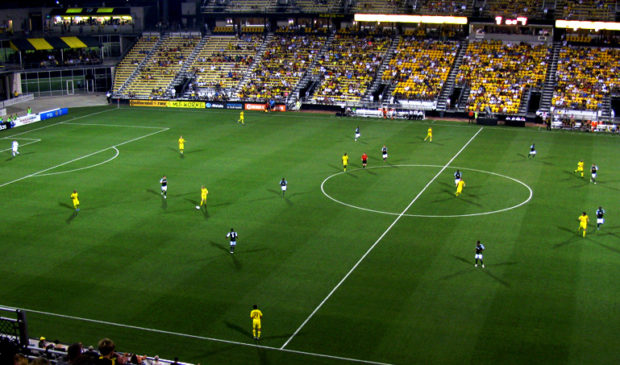Stadium opposition moves east to Guerrero Park
Monday, February 5, 2018 by
Chad Swiatecki East Austin residents and other community groups are pushing for City Council to take a vote on a resolution that would remove city parkland from the sites under consideration for a proposed stadium for a Major League Soccer club.
Groups such as People Organized in Defense of Earth and her Resources (PODER) and the East Riverside/Oltorf Combined Neighborhood Planning Area want Council Member Ann Kitchen to put the resolution back on the agenda for the Feb. 15 Council meeting. The item was proposed when two parkland sites were under consideration for the stadium site, but was pulled after Precourt Sports Ventures – the group looking to relocate the Columbus Crew team to Austin – said it would no longer try to build the stadium on Butler Shores Metropolitan Park.
That decision means Roy G. Guerrero Colorado River Park between North Pleasant Valley Road and Montopolis Drive in East Austin remains a possibility for construction.
A protest on Saturday at the park drew about 60 participants who called attention to the opposition for a stadium built on parkland. One non-parkland site owned by the city – McKalla Place near the Domain – is still under consideration for stadium construction, along with whatever private land deals that PSV is exploring.
“We’ve worked over 10 years to preserve Guerrero Park to create a balance between nature and humanity,” said Susana Almanza, director of PODER. “Bringing 20,000 people in there would be a major devastation to the park and to the wildlife and would create environmental devastation.”
Almanza said the one road into the park would become quickly overburdened by more than 10,000 vehicles traveling in and out. In addition, she said the city still needs to address erosion and flooding issues that have damaged large portions of the property. Because of that, she said PODER plans to take up the issue with the city’s Equity Office to discuss why a private business interest is getting more attention there than residents are.
Almanza said she’s received no response to messages to her brother Council Member Pio Renteria, who supports keeping the park under consideration as a possible stadium site. His view included a push for a public vote on the use of parkland so that residents and not Council would decide how to best use the property.
“We’re not against soccer, but it shouldn’t be for profit on public parkland,” she said. “It’s also a matter of protecting public parkland that is free. We don’t want Austin to follow the national trend of selling off and privatizing parkland.”
On Friday Kimberly McNeeley, acting director of Austin’s Parks and Recreation Department, issued a memo stating that city staff will not have any further data related to the city properties eyed for the stadium in time for the Feb. 15 Council meeting. She said a more productive process would be for the city and PSV to discuss the basics of a possible land use agreement, with staff then taking that information to the public to gather feedback over a three-month period.
Precourt representatives responded with a memo saying they support the less aggressive timeline so they could carefully study all factors related to stadium construction in Austin. They did not offer comment on what that might mean for their hopes to have the team in Austin in time for the spring 2019 season.
Other groups long opposed to development of parkland joined in on Saturday’s protest, arguing that city staff is wasting time and resources researching deals that Austin residents aren’t in favor of.
“There’s no consensus on this, and staff shouldn’t be wasting any more time figuring out how the city can give away our parkland,” said Bill Bunch, executive director of the Save Our Springs Alliance. “The Kitchen resolution would help, because once you open the door on this, everyone will come wanting free land.”
Photo by Matthew Bernhardt [CC BY-SA 2.0], via Wikimedia Commons.
The Austin Monitor’s work is made possible by donations from the community. Though our reporting covers donors from time to time, we are careful to keep business and editorial efforts separate while maintaining transparency. A complete list of donors is available here, and our code of ethics is explained here.
You're a community leader
And we’re honored you look to us for serious, in-depth news. You know a strong community needs local and dedicated watchdog reporting. We’re here for you and that won’t change. Now will you take the powerful next step and support our nonprofit news organization?









